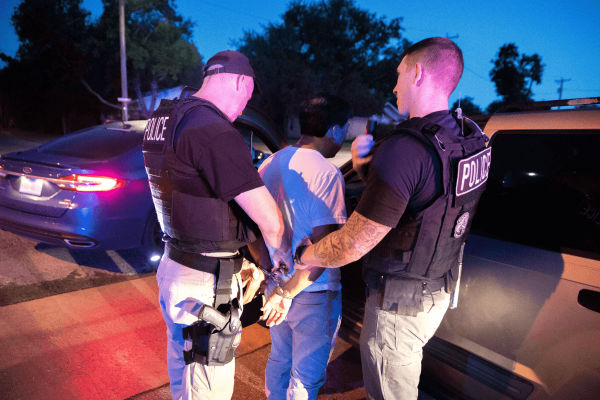More than two dozen Christian and Jewish groups are suing the Department of Homeland Security over President Donald Trump’s decision to allow law enforcement raids and arrests in churches and other sensitive locations.
“Plaintiffs’ religious scripture, teaching, and traditions offer clear, repeated, and irrefutable unanimity on their obligation to embrace, serve, and defend the refugees, asylum seekers, and immigrants in their midst without regard to documentation or legal status,” the groups write in the lawsuit.
The lawsuit was filed by Georgetown University’s Institute for Constitutional Advocacy and Protection, on behalf of 27 national denominations, regional bodies, and organizational coalitions.
The filing comes nearly a month after Trump’s decision to rescind a long-standing policy that restricted Immigration and Customs Enforcement and other agencies from performing immigration arrests or raids in “sensitive locations.” NBC News had reported Trump’s plan in December, which he carried out on the first day of his presidency.
In a press conference on Tuesday, religious leaders explained why they chose to become plaintiffs in the lawsuit despite the risk of backlash or retaliation from the president or his supporters.
Iris de León-Hartshorn, an associate director for Mennonite Church USA, said the denomination didn’t join litigation lightly, but found that it was “probably the best course of action to advocate for our religious freedom to worship and minister in our communities as followers of Jesus.”
She spoke about the tradition of “nonresistance,” held to by Mennonites and other Anabaptists. While the term has always been debated, historically Anabaptist groups have refused to serve in war and been hesitant to use politics as a forum for influence.
“Our practice of loving our neighbor outweighs our traditional stance of nonresistance,” she said.
Legally, the faith groups are arguing that the rescinding of the sensitive locations policy violates the First Amendment rights to freedom of religion and expression, and the Religious Freedom Restoration Act.
RFRA restricts the government from efforts that would “substantially burden” the exercise of religion, “even if the burden results from a rule of general applicability.” It requires the government to find a “compelling governmental interest” in creating laws that restrict expression and requires the government us the “least restrictive means of furthering that compelling governmental interest.”
Kelsi Corkran, the Institute’s Supreme Court director and lead counsel on the lawsuit, explained that churches are already being impeded by the threat of ICE, Customs and Border Protection, or other law enforcement interrupting their service.
“Congregations are experiencing decreases in worship attendance and social service participation due to fears of ICE,” she said. “They're put in this untenable position where they have to choose whether or not to continue to welcome and encourage undocumented people into their places of worship.”
The original DHS memo restricting ICE, CBP, and other departments was issued in 2011 and updated in 2021. It allowed for several exceptions but largely argued that DHS could “accomplish our enforcement mission without denying or limiting individuals’ access to needed medical care, children access to their schools, the displaced access to food and shelter, people of faith access to their places of worship, and more.”
Corkran and the plaintiffs hope that the lawsuit will convince a judge to issue an injunction on Trump’s rescinding of the “sensitive locations” memo. But that injunction would only apply to the plaintiffs, meaning only those congregations represented by the plaintiffs would be protected. Corkran said that she’s received numerous emails from groups interested in joining the lawsuit as plaintiffs.
The 27 groups filing the lawsuit are the Mennonite Church USA, the African Methodist Episcopal Zion Church, the Central Atlantic Conference United Church of Christ, the Central Conference of American Rabbis, Christian Church (Disciples of Christ), Church of the Brethren, Inc., Convención Bautista Hispana de Texas, the Episcopal Church, Fellowship Southwest, Friends General Conference, General Assembly of the Presbyterian Church (U.S.A.), General Commission on Religion and Race of the United Methodist Church, Latino Christian National Network, Massachusetts Council of Churches, the New York Annual Conference of the United Methodist Church, New York State Council of Churches, North Carolina Council of Churches, the North Georgia Conference of the United Methodist Church, the Rabbinical Assembly, Reconstructing Judaism, Rhode Island State Council of Churches, Union for Reform Judaism, Unitarian Universalist Association, the United Synagogue of Conservative Judaism, the Western North Carolina Conference of the United Methodist Church, Wisconsin Council of Churches, and Wisdom, Inc.
Rev. Carlos Malavé, president of the Latino Christian National Network, said he is hearing stories of churches canceling services in fear of putting immigrant communities at risk. The news outlet Block Club Chicago reported that at least one church had moved their Spanish-language service online over arrest and deportation fears.
“They cannot take the risk to go to those places at this point,” Malavé said. [Editor's note: Malavé is a Sojourners board member. Learn about our editorial independence policies.]
Rev. Sean Rowe, presiding bishop of The Episcopal Church, said that regardless the outcome of the lawsuit, the church “will not stop in our efforts to see to it that people are safe, that they can worship freely, and that they can find peace in those places [of worship].”
Got something to say about what you're reading? We value your feedback!







